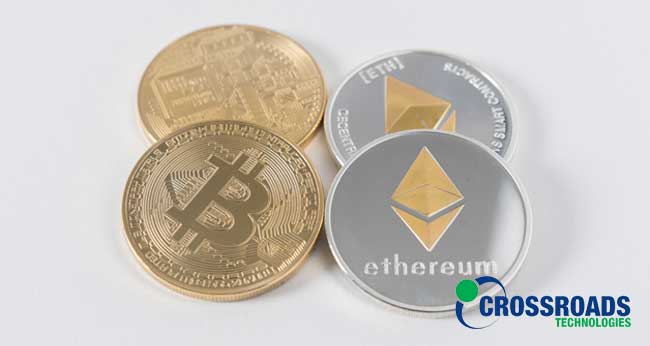
Cryptocurrency has permeated tech news for some time now, with exciting projections and new forms of currency being reported regularly using the blockchain. It’s tempting for businesses, small businesses even more so for that matter, to brush off cryptocurrency as a current fad, not considered sustainable or relevant to their business. However, each new announcement of a trailblazing digital ecosystem is further proof that cryptocurrency will likely go on to be much more than a novelty technology. Even as a small business, it may be more practical than you think to embrace cryptocurrency into your business model.
How is cryptocurrency impacting small businesses?
In most cases, the overriding mentality is that most people aren’t yet using cryptos as a primary form of currency, so the volume of purchases would be very small. This might be true for the current state of bitcoin and, increasingly, other forms of cryptocurrency; however, the more business owners are delving into digital currency, they are finding out that it is much more secure than they previously thought. Not to mention that it is a widely accepted opinion that the wave of alternative currency is here to stay. Becoming an early adopter of the movement as a merchant of digital currency could give you an advantage over other, more hesitant small business owners. Not to mention that the implementation process is simple; it’s quite easy to set up and integrate into your current POS system. More and more accounting software includes integrations that allow for a fluid transition into accepting cryptocurrencies.
One central reason many small businesses are embracing bitcoin and other cryptocurrencies as legitimate tender is the freedom it allows them. As previously mentioned, cryptocurrencies are information that is stored on a network of computers—blockchain— that are decentralized, allowing greater control without relying on central banks to maintain and regulate currency. Cryptocurrencies can be directly transferred from a digital wallet without involving a third party, thus eliminating the wait time for the currency to show up in your account, they also exclude an outside party from interfering because they host the platform where transactions are made.
Cut out third parties
Cryptocurrency eliminates the intermediary third party that facilitates the payment and typically charges 2% - 3% in processing fees with traditional credit card and bank transactions. This is by far one of the major advantages to opening up your payment system to include cryptocurrency for your services. The architecture of cryptocurrency includes decentralized ledgers, enabling peer-to-peer digital exchange which cuts out the middle man entirely. The savings from processing fees could add up quickly as cryptocurrency continues to become more mainstream and more widely accepted.
Hi-speed irreversible transactions
Due to the nature of the blockchain, any transactions a customer initiates becomes final and irreversible. Once the customer makes the payment, it cannot be cancelled, leaving small businesses free from the suffering of cancellations and chargebacks. The blockchain ledger is nearly impossible to modify, as it almost instantly produces a history of the transaction. This is one of the glaring aspects of cryptocurrency that adds security well beyond traditional currency. High speed transactions mean that coins can be verified in your merchant wallet in 10 minutes or less in most cases. This is an obvious preference for most, to waiting the usual 2-3 days for a credit card transaction to clear.
Cryptocurrency and security: stay informed to manage the risks
Because cryptocurrency is built on blockchain which is decentralized, operating independently of a central bank, and offline, it is generally a much more secure system than current banking systems and third parties that are vulnerable to cyber threats. Smart small business owners should stay informed and consider any security risks that come to light. Because coins aren’t currently regulated, it’s important to remain informed about any future legislation regarding cryptocurrency. Cryptocurrency is a hot topic, and will likely permanently change the digital landscape. Stay alert to cyber risk as the technology, while relatively secure, is still burgeoning and seeing fluctuations. Protect yourself from vulnerabilities. While it’s difficult, bitcoin and other cryptocurrencies aren’t impervious to cyberattacks.
Overall, there seem to be few setbacks to accepting cryptocurrency as a part of your small business model. It’s more secure than credit card processing and will likely only gain popularity for its sophistication. The advantages to small business owners by integrating merchant wallets and accepting that we are in a digital age that is thriving and moving forward can put them far ahead other, more hesitant adopters. Cryptocurrency is not just an obscure technology trend, it’s a necessary reality that we suggest you gain an education on and stay up to date with forthcoming information. Bitcoin is not just for the tech-minded, we’re coming upon an era where alternate currency and peer-to-peer exchange is inevitable.
For more information on, or to speak with Crossroads Technologies, Advisory Services Division, contact us at 1 (866) 216-4366 or engageThis email address is being protected from spambots. You need JavaScript enabled to view it..
Articles You Might Find Interesting:
Are you Ready for the GDPR to Go into Effect?
5 Things Every CEO Should Know About the GDPR
Is Shadow IT Infiltrating Your Business without Your Knowledge?
The GDPR is Almost Here, What Does that Mean for Healthcare Organizations?
Share this article:


